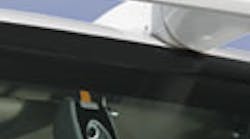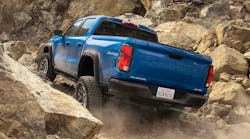Iteris, Inc. has announced that Melton Truck Lines will make Iteris’ Lane Departure Warning (LDW) system standard equipment on some 1000 new trucks over the next three years.
“When it comes to highway safety and ensuring our customers’ goods arrive on time, we believe adding LDW to our trucks will further our continuing goal of improving highway safety,” said Bob Peterson, president of Melton. “Safety is a top priority for every well managed trucking company and we believe that our decision to install LDW will have a positive impact in reducing accidents.” Based in Tulsa, Melton is one of the largest flatbed trucking companies in the nation. It is the fourth major flatbed carrier to install LDW as standard equipment.
Iteris said its LDW system is the first-of-its-kind to be deployed in the commercial truck and passenger car markets and remains the only vision-based system in mass production in the U.S., Europe, and Asia.
“We’re pleased to see another large flatbed carrier recognize the value of our LDW technology and Iteris looks forward to working with Melton on future installations,” said Francis Memole, senior vp of vehicle sensors for Iteris. “Based on data Iteris is receiving from other fleet customers that are seeing significant decreases in lane departure-related accidents, we expect Melton will see a positive return on their investment in a short period of time.”
According to Iteris, from January 1,2006 to September 6, 2007, another LDW customer, Prime, Inc., drove their trucks with and without using the LDW system. For trucks who did not use the system, there were 92 preventable accidents over 489 million miles (a rate of .18 accidents per million miles), and for trucks equipped with the system, there were 6 preventable accidents over 96.5 million miles (a rate of .062 accidents), leading to a 65% reduction in preventable accidents.
The company’s statistics go further to state that the 19.3 accidents that would have occurred without the technology would be reduced to only 8.1. And with an average cost of $52,000 to fix each accident would have saved the company about $649,000. With the cost of installation, Iteris estimates that the technology pays for itself in about 1.08 years and saves approximately $.67 per 100 miles.
Studies similar to this one have led to a number of fleets beginning to use the Iteris system. Shari Roseboom, Director of marketing & communications for Iteris, told FleetOwner, “It’s already having and will continue to have a significant effect on leaving lanes and leaving the roadway.” Accidents cost fleets financially, as repair costs can be extensive and smaller fleets may see a substantial rise in their insurance rates following an accident, she noted.
The Iteris LDW system works through a camera mounted in the front of the cab, on the windshield, which acts as another set of eyes for the driver. When the truck begins to drift over either the center line or the edge of the road, the camera “reads” the line and sends an audible warning—a sound similar that made when a vehicle goes over rumble strips—alerting the driver. The system, which is all software-based, works in all road conditions but does not kick into effect when the truck is either driving under 35 MPH or using its turn signal, according to Iteris.




